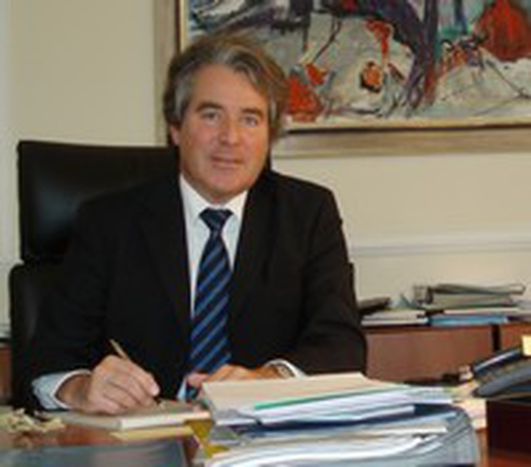
'It is our right to organise our fiscal system as we please'
Published on
Translation by:
 angelina robinson
angelina robinson
Switzerland’s stubborn neutrality and the fact that the country is considered a tax haven by many, these are the issues we want to discuss with the Swiss ambassador to the EU
The Swiss amabassador to the EU, Bernhard Marfurt, represents his country in negotiations with the Brussels-based EU institutions and argues that the relation between the Union and Switzerland is reciprocal and very productive, despite the difference that separares them – their respective political systems.
What do you think was the reason for the ‘No’ to an accession to the European Economic Community (EEC) in 1992?
There were several reasons but the most important was that an entry would have affected our political system.The thing is that in the interior communal market there are areas for which the decisions are taken from Brussels, while in Switzerland the political system ensures that it is the people that have the last say over policy in the corresponding fields: the formula being the referendum – a formula often used in our country. Sometimes there are up to four referenda per year. Joining the EEC would mean a reshuffle of powers which would end the Swiss political system. As things stand, bilateral agreements allow us more liberty.
If Switzerland belonged to the EU, would it loose its neutrality?
No. There are other EU states that consider themselves neutral, at least in some international conflicts. Austria is a good example. This doesn't mean that we couldn't show solidarity with the other states, only that it would stop short of military cooperation. I don't think that there is anything in current legislation that obliges the states to abandon their neutrality.
What would you answer to those who say that Switzerland is a tax haven for rich Europeans who want to avoid paying taxes in their home countries?
I would say to them that Switzerland has a tradition of low taxes and that in Switzerland it is the people that decide on their taxes. If a canton wants to increase its taxes, it has to hold a referendum and the people decide. At the base of it all is a very efficient check on political power that prevents very high taxes from being introduced. I know that compared with those of some EU states, our taxes are very low, but they are legitimate. It is our right to organise our fiscal system as we please. Furthermore, in some EU states, such as the UK, there is legislation providing tax incentives for people to choose certain areas over others for residence or work. So we are not the only country with treaties that attract people that earn a lot of money.
So is it fair to say that Switzerland is a tax haven?
It all depends of what you understand by the term 'tax haven'. In Switzerland everybody pays taxes but it is true that there is separate legislation for people who do not work in Switzerland, as is the case with French singer Johnny Halliday for example. However, the number of people concerned is insignificant – around 3, 500
in total.
Are the Swiss nationalist?
I find your question quite surprising, especially bearing in mind that there are about 21% foreigners in Switzerland. After Luxembourg, that is the highest rate of foreigners in a European country. I do not think it fair therefore to describe Swiss as xenophobic, rather the opposite. Of course we are proud of our nation, of our country. If the Swiss national football team plays another, of course we will support ours, but I do not think there is an exaggerated nationalism which is important in our relations with the EU. I thik that it is rather our tradition of direct democracy that distinguishes us from and is the main obstacle to our accession to the EU.
Translated from Bernhard Marfurt: “Suiza tiene derecho a poner los impuestos que quiera”


